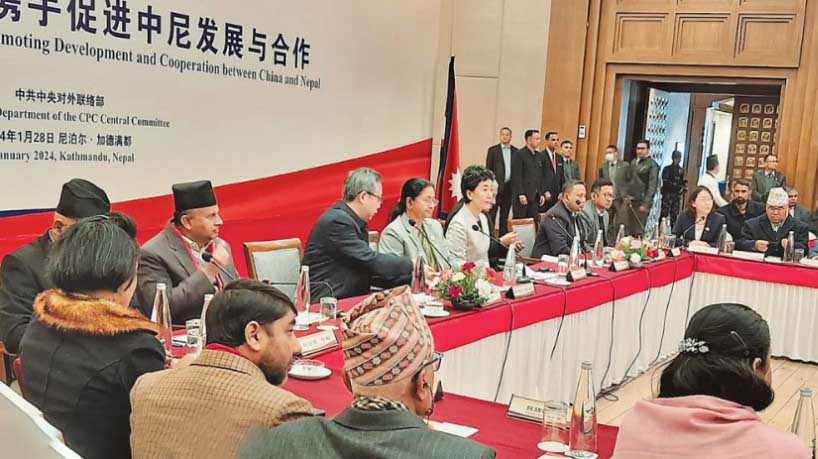(TibetanReview.net, Jan29’24) – In what is seen as an unprecedented move, visiting Chinese leaders have publicly claimed that certain countries were trying to destabilise the good relations between Nepal and China, while some elements were also defaming the Belt and Road Initiative (BRI) by calling it a ‘debt trap’, reported the kathmandupost.com Jan 29. The occasion was a consultative conference in Kathmandu between Nepali political leaders and Communist Party of China, during which Nepal was also asked to improve its investment climate.
The report said that during an interaction with second-rung leaders of major political parties represented in the country’s Parliament, Sun Haiyan, the vice minister of the International Liaison Department of the Communist Party of China, alleged that some countries were trying to disrupt development cooperation between Nepal and China and defame bilateral relations.
“…Some criticise our relations. Some are trying to sabotage our bilateral relations and some have increased activity against China,” Sun was quoted as saying during the first conference of its kind.
The report said some Nepali leaders afterwards labelled Sun’s statement as “belligerent”, noting that Chinese leaders typically would not use such direct language in public discussions.

Yes, they would use such ‘direct and aggressive’ language during private conversations, but never in public forums like this, the report cited two leaders who took part in the conference as saying.
“It seems the Chinese are not happy with the current state of relations with Nepal or the way they are being publicly projected, both in and outside Nepal,” one of the participants has said.
“They may feel a threat from Nepal, or they could have sensed that some external forces are trying to create a rift between Kathmandu and Beijing.”
Sun skillfully asked Nepali leaders to avoid being too close to Americans and Indians, a CPN (Maoist Centre) leader from the ruling coalition has said. “Earlier they used to convey such concerns behind closed doors, but now they are saying it in public.”
Sun was stated to have asked a leader from each party to speak by focusing on three things: Nepal-China ties, and fostering and enhancing these ties in the changing context; the type of relations needed in the future; and the role Nepali political parties can play to strengthen bilateral ties.
But except for the most pro-China UML’s General Secretary Shankar Pokhrel, no other leader was stated to have directly addressed Sun’s topics. However, they all have committed to boosting relations with China, expressed Nepal’s desire to benefit from China’s economic growth, and reaffirmed their commitment to ‘One China’ policy as well as the BRI.
Sun has also complained about Nepal’s investment climate, saying it was not favourable for investors, and urged party leaders to diversify infrastructure and facilitate Chinese investment.
Chinese Ambassador to Nepal Chen Song, has also spoken in a combative tone, asking why the same Chinese companies, which were completing projects in other countries within set deadlines, had been unable to do so in Nepal.
“We have to find out why projects undertaken by the Chinese are getting delayed,” Chen has said, adding, “Is it only due to us? No. You have to assess it.”
Chen also expressed concerns over “negative reporting on the BRI” and on Sino-Nepal ties but did not specify which of the Nepali media was doing it, the report said.
These attacks have not gone down well with a UML leader who has told the Post “An ambassador should not speak so frivolously without clear evidence to back up his words. … Making such unfounded statements is unbecoming of an ambassador. They should understand that Nepali media is free and they report by keeping in mind the fundamental interests of the country. The same is true of Nepali political parties.”


